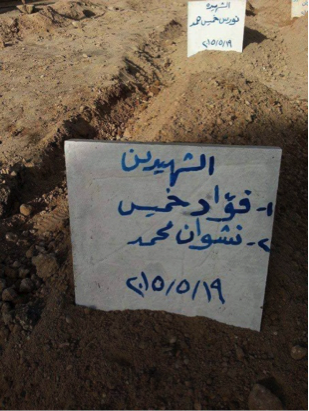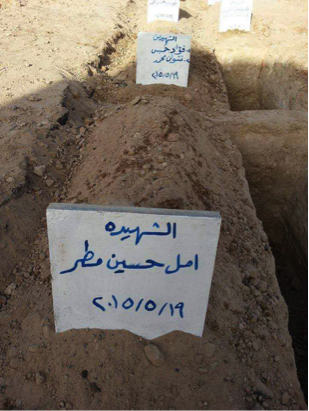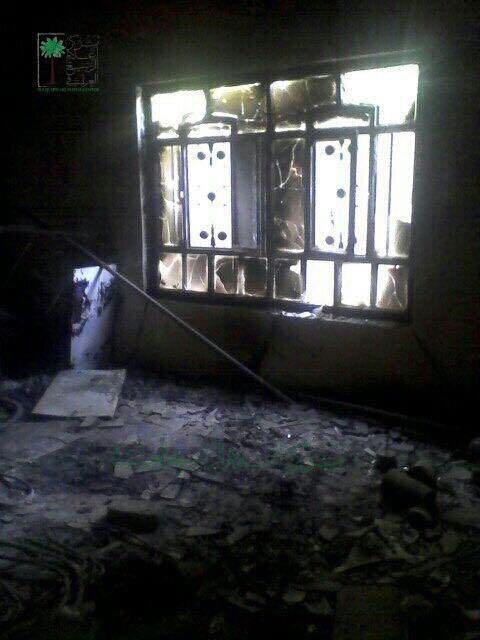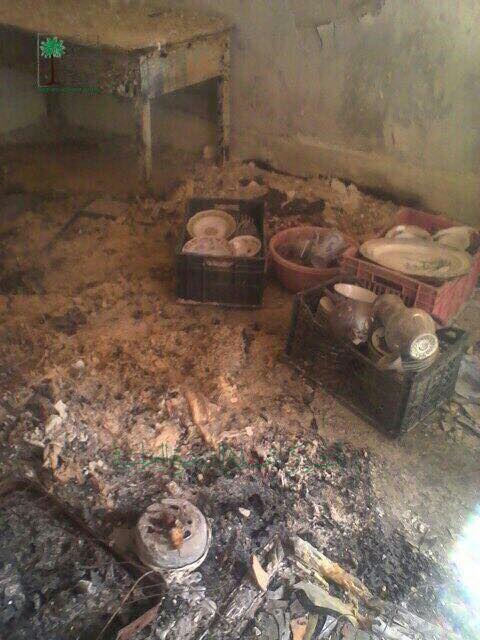www.aljazeerah.info
News, May 2015
Archives
Mission & Name
Conflict Terminology
Editorials
Gaza Holocaust
Gulf War
Isdood
Islam
News
News Photos
Opinion Editorials
US Foreign Policy (Dr. El-Najjar's Articles)
www.aljazeerah.info
|
Editorial Note: The following news reports are summaries from original sources. They may also include corrections of Arabic names and political terminology. Comments are in parentheses. |
Islamic State Fighters Tighten Grip on Ramadi, Government Militias, Forces Attack Fallouja Killing Civilians, Burning Homes
May 20, 2015
 |
 |
 |
 |
Above: Graves of Iraqi men, women, and children who were killed by Iraqi government forces and militias in their attacks on Fallouja, on May 19, 2015.
Bottom: Iraqi homes burned by Iraqi government militias in their attacks on Fallouja, on May 19, 2015. (Iraqi Spring).
***
News stories in English are below the following Arabic news from Iraq Spring and Yeqen news agencies:
الأخبار السياسية |
الأخبار السياسية |
الأخبار السياسية |
***
Iraq Spring Information Center
http://www.iraqispring.com/?article=674
نشرة مركز اعلام الربيع العراقي
لأحداث الثورة الشعبية العراقية
نشرة رقم (557)
الاربعاء: 20/5/2015
النشرة للأحداث التي جرت لـ24 ساعة الماضية
* بغداد :
* مقتل ضابط برتبة نقيب في الداخلية بتفجير عبوة لاصقة اسفل سيارته في منطقة حي العامل.
* مقتل 3 من افراد القوات الحكومية بينهم ضابط، بهجوم مسلح ل"تنظيم الدولة" في المشاهدة.
* سيطرة الجيش الحكومي من الفرقة/17 في منطقة الحصوة تبتز المواطنين من نازحي عوئل الأنبار لمن اراد أن يتجاوزها للدخول باتجاه جنوب بغداد بدفع ألف دولار.
*مقتل واصابة "9" اشخاص بانفجار عبوة ناسفة في ناحية الرشيد جنوب بغداد.
* مقتل موظف حكومي في وزارة التجارة بهجوم مسلح نفذته الميليشيات على طريق القناة شرق بغداد.
* الانبار :
* مجلس عامرية الفلوجة: يعلن وفاة "٥" نازحين عند جسر بزيبز؛ جراء ارتفاع درجات الحرارة ونقص الماء والغذاء بسبب منع القوات الحكومية عبورهم الجسر.
* مقتل 8 جنود من الجيش الحكومي بتفجير استهدف ثكنتهم شرقي الفلوجة.
* قوات الجيش الحكومي تقوم بإدخال نازحين إلى منتصف جسر بزيبيز لغرض التصوير ثم تقوم بإعادتهم من منتصف الجسر لغرض إيهام الرأي العام والإعلام بأن الجسر مفتوح وسالك.
* مقتل 2 من رعاة الغنم بقصف جوي بالحاويات المتفجرة استهدف منطقة الدواية بناحية الكرمة شرقي الفلوجة.
* معاناة نازحي الانبار على جسر بزيبز؛ بسبب عدم سماح الحكومة لهم بالدخول.
https://youtu.be/u26LU30ud4c?t=33
وكيل وزارة الهجرة والمهجرين: اوامر من القيادات العليا بعدم مساعدة نازحي الرمادي
* احد افراد الجيش الحكومي يعتدي بالضرب على نازحي الرمادي في جسر بزيبز.
الرمادي:
* عناصر من تنظيم الدولة الإسلامية يسيطرون على بناية آمرية الأفواج في منطقة الكيلو ١٨ قرب الرمادي،ويستولون على كميات كبيرة من الأسلحة والمعدات.
الفلوجة:
* الطيران الحربي يستهدف منطقة الصقلاوية غرب الفلوجة.
* أهالي الفلوجة يدفنون ضحايا القصف العشوائي من قبل القوات الحكومية وميليشيات الحشد على منازل المدنيين في المدينة.
***
Iraqi forces say they defeat Islamist attack near Ramadi
Wed May 20, 2015 6:17am EDT
BAGHDAD
Iraqi forces said they fought off an overnight attack by Islamic State militants near the city of Ramadi, which the insurgents overran at the weekend in the most significant setback for the government in a year.
Islamic State is seeking to consolidate its gains in the vast desert province of Anbar, of which Ramadi is capital, where only isolated pockets of territory remain under government control. The IS advance has exposed the failings of Iraq's army and the limitations of U.S. airstrikes.
Government forces backed by Shi'ite militias have meanwhile been building up at a base near Ramadi in preparation for a counterattack to retake the city, where Islamic State forces have tanks and artillery abandoned by fleeing Iraqi forces.
Overnight, Islamic State fighters attacked government forces in the town of Husaiba al-Sharqiya, about halfway between Ramadi and the Habbaniya military base where militia fighters have assembled, police and pro-government forces said.
“The Islamic State attacked us around midnight after a wave of mortar shelling on our positions," Amir al-Fahdawi, a leader of the pro-government Sunni tribal force in the area, told Reuters.
"This time they came from another direction in an attempt to launch a surprise attack, but we were vigilant and, after around four hours of fighting, we aborted their offensive,” he added.
The Habbaniya base is midway between Ramadi and the town of Fallujah, which has been under Islamic State control for more than a year and is 50 km (30 miles) from the Iraqi capital. Islamic State appears to be trying to join up Ramadi and Fallujah by taking territory between the two towns.
As pressure mounted for action to retake Ramadi, a local government official urged citizens to join the police and the army to join what Shi'ite militiamen have said will be the "Battle of Anbar".
Islamic State fighters have set up defensive positions and laid landmines, witnesses in Ramadi said. The group's black flags are flying over the main mosque and other public buildings.
The White House said a U.S.-led air campaign would back Iraqi forces in their attempt to regain Ramadi, whose fall exposed the limits of U.S. air power in its battle against the radical Sunni Islamic State in both Iraq and Syria.
The United States is anxious that the Shi'ite militia are controlled by the Iraqi authorities rather than Iranian advisers.
There are also fears in Washington and elsewhere that the fighting in Iraq will become a polarizing clash between Shi'ites and Sunnis as Iraqi Prime Minister Haider al-Abadi becomes increasingly dependent on the Iranian-backed Shi'ite militias to step in where the Iraqi military has failed.
Abadi's decision to send in the militia, known as Hashid Shaabi or Popular Mobilisation, to try to retake the predominantly Sunni city of Ramadi could stir up further sectarian hostility in one of the most violent parts of Iraq.
Ramadi was Islamic State's biggest success since it captured the northern city of Mosul last year and declared itself an Islamic caliphate. While it has been forces to give ground in Tikrit, Saddam Hussein's home town, and in the Syrian city of Kobani, the group still controls large areas of Iraq and Syria.
Local officials have said 500 people were killed in the fighting to take Ramadi and the international migration agency says more than 40,000 people have fled the city.
While the Abadi government has renewed its pledge to equip and train pro-government Sunni tribes with a view to replicating the "surge" campaign of 2006-07, when U.S. Marines turned the tide against al Qaeda -- forerunners of Islamic State -- by arming and paying local tribes in a movement known as the Anbar Awakening.
But a repeat will be more difficult. Sunni tribal leaders complain that the government was not serious about arming them again, and say they received only token support.
When the Iraqi forces beat a hasty retreat from Ramadi at the weekend, they left behind a large amount of military supplies, including about a half a dozen tanks, around 100 wheeled vehicles and some artillery, the Pentagon said.
A Pentagon spokesman said it would have been preferable if the Iraqi troops had destroyed the equipment before leaving.
(Reporting by Baghdad Bureau; Additional reporting by Phil Stewart and Julia Edwards in Washington; Writing by Giles Elgood; editing by Janet McBride)
Iraq deploys tanks as Islamic State tightens grip on Ramadi
Tue May 19, 2015 7:42pm ED
Iraqi security forces on Tuesday deployed tanks and artillery around Ramadi to confront Islamic State fighters who have captured the city in a major defeat for the Baghdad government and its Western backers.
After Ramadi fell on Sunday, Shi'ite militiamen allied to the Iraqi army had advanced to a nearby base in preparation for a counterattack on the city, which lies in the Sunni Muslim province of Anbar, just 110 km (70 miles) northwest of Baghdad.
As pressure mounted for action to retake the city, a local government official urged Ramadi residents to join the police and the army for what the Shi'ite militiamen said would be the "Battle of Anbar".
The White House said a U.S.-led air campaign would back multi-sectarian Iraqi forces in their attempt to regain Ramadi, whose fall exposed the limits of U.S. airpower in its battle against the radical Sunni Islamic State in both Iraq and Syria.
"The United States will be very supportive of multi-sectarian efforts who are taking command-and-control orders from the Iraqi central government," White House spokesman Josh Earnest said in Washington.
The United States is anxious that the Shi'ite militia are controlled by the Iraqi authorities rather than Iranian advisors. It is likewise worried that the fighting in Iraq will become a polarizing clash between Shi'ites and Sunnis.
Islamic State fighters set up defensive positions and laid landmines, witnesses said. The Islamists were also going house to house searching for members of the police and armed forces.
The group has promised to set up courts based on Islamic Sharia law, as they had done in other towns and cities they have conquered. They released about 100 prisoners from the counter-terrorism detention center in the city.
Saed Hammad al-Dulaimi, 37, a school teacher who is still in the city, said: "Islamic State used loudspeakers urging people who have relatives in prison to gather at the main mosque in the city center to pick them up. I saw men rushing to the mosque to receive their prisoners."
The move could prove popular with residents who have complained that people are often subject to arbitrary detention.
Sami Abed Saheb, 37, a Ramadi restaurant owner, said Islamic State found 30 women and 71 men in the detention center. They had been shot in the feet to prevent them escaping when their captors fled.
Witnesses said the black flag of Islamic State was flying over the main mosque, government offices and other prominent buildings in Ramadi.
Jasim Mohammed, 49, who owns a women's clothing shop, said an Islamic State member had told him he must now sell only traditional Islamic garments.
"I had to remove the mannequins and replace them with other means of displaying the clothes. He told me that I shouldn't sell underwear because it's forbidden," he said.
Islamic State had also promised that food, medicine and doctors would soon be available.
Dulaimi said Islamic State fighters were using cranes to lift blast walls from the streets and bulldozers to shovel away sand barriers built by security forces before they fled.
"I think they (Islamic State) are trying to win the sympathy of people in Ramadi and give them moments of peace and freedom," he said.
SECTARIAN HOSTILITY
The decision by Prime Minister Haider al-Abadi, who is a Shi'ite, to send in the militia, known as Hashid Shaabi or Popular Mobilization, to try to retake the predominantly Sunni city could add to sectarian hostility in one of the most violent parts of Iraq.
The Abadi government had pledged to equip and train pro-government Sunni tribes with a view to replicating the model applied during the "surge" campaign of 2006-07, when U.S. Marines turned the tide against al Qaeda fighters -- forerunners of Islamic State -- by arming and paying local tribes in a movement known as the Anbar Awakening.
But a repeat will be more difficult. Sunni tribal leaders complain that the government was not serious about arming them again, and say they received only token support.
There are fears that weapons provided to Sunni tribes could end up with Islamic State.
When the Iraqi forces beat a hasty retreated from Ramadi at the weekend, they left behind a large amount of military supplies, including about a half a dozen tanks, around 100 wheeled vehicles and some artillery, the Pentagon said.
Asked whether the regular troops should have eliminated such material before quitting the city, Pentagon spokesman Colonel Steve Warren said: "It certainly would have been preferable if they had been destroyed."
Iraqi ministers on Tuesday stressed the need to arm and train police and tribal fighters. Abadi called for national unity in the battle to defend Iraq.
A spokesman for Iraqi military operations, Saad Maan, said the armed forces controlled areas between Ramadi and the Habbaniya military base about 30 km (20 miles) away, where the militia fighters are waiting.
"Security forces are reinforcing their positions and setting three defensive lines around Ramadi to repel any attempts by terrorists to launch further attacks," Maan said.
"All these three defensive lines will become offensive launch-pads once we determine the zero hour to liberate Ramadi."
The International Organization for Migration said 40,000 people had been forced to flee the city in the past four days.
About 500 people were killed in the fighting for Ramadi in recent days, local officials said.
Islamic State gains in Ramadi mean it will take longer for Iraqi forces to move against them in Mosul, where militants celebrated victory in Anbar by firing shots into the air, sounding car horns and playing Islamic anthems, residents said.
(Reporting by Baghdad Bureau; Additional reporting by Stephen Kalin, by Phil Stewart and Julia Edwards in Washington; Writing by Giles Elgood; editing by Janet McBride and Crispian Balmer)
Islamic State learns lessons from U.S. raid: jihadist sources
Tue May 19, 2015 11:10pm EDT, Reuters
BEIRUT | By Mariam Karouny
A U.S. special forces raid against an Islamic State leader in Syria caught the jihadist group off guard, killing not only the declared target, but also two other important figures, jihadist sources in Syria said.
The sources said a spy must have infiltrated the movement and passed on vital information that helped the U.S. commandos zero in on the home of their victim early Saturday when most of the guards had left to join a battle elsewhere.
They said the group had absorbed the shock, but promised that any culprits would be discovered. The Islamic State was also considering tightening its recruitment procedures to try to root out moles and was considering forming a specialist unit to counter such attacks in future.
"This is a lesson for us. We consider what happened as a lesson not to underestimate our enemy regardless who he is," said one of the group's fighters inside Syria reached by Reuters via the Internet, who declined to be named.
The fighters are not allowed to speak to the media and face severe punishment if they flout the rule.
U.S. Delta Force reached deep into eastern Syria in the early hours of Saturday for their ground assault, departing from their usual reliance on air strikes alone to hit the Islamic State, which holds swathes of both Iraq and Syria.
During the raid, the U.S. troops killed Abu Sayyaf - a Tunisian citizen who Washington believes was responsible for overseeing Islamic State's financial operations and was involved in the handling of foreign hostages.
Islamic State has yet to make any formal statement about the attack in Deir al-Zoar province, and it appears to be business as usual in the territory it holds. A resident in the northeastern Syrian city of Raqqa - the group's de facto capital - said life continued as before.
Sources told Reuters that two other leaders died in Saturday's incursion - Abu Taym, a Saudi believed to oversee oil operations in the area, and Abu Mariam, who worked on group communications. His nationality was not immediately known.
Abu Sayyaf's two brothers were wounded and his wife, who is believed to have overseen a slave market for abducted Yazidi women, was captured and flown back to Iraq.
"The reason this has happened is because of the spies. Someone from inside has helped them," said a fighter within Syria, who asked not to be named for security reasons.
"They knew exactly where to go and when. They went to the building where he was staying with his family. They did it at a time when we have minimized the guards around the compound because they were sent to a battle," he said.
RESTRICTIONS ON RECRUITS
Abu Sayyaf and his family were staying in a compound that contained at least 50 buildings, each four storeys high, where 1,000 people including civilians lived.
The compound was built by the Syrian government to accommodate families of employees and engineers who run the nearby al-Omar gas and oil plant.
When Islamic State seized the area last year, it kept only a few dozen government employees, enough to operate the plant. The rest were killed or expelled and their houses handed over to Islamic State fighters and their families.
"The (Islamic) State is now taking new measures. One of those measures is to increase restrictions on joining. Members will be reviewed and new ones will have to be recommended. Whoever they are," said a Syrian Islamic State fighter from inside Syria.
Earlier this month, Islamic State issued an audio recording that it said was by its leader Abu Bakr al-Baghdadi, calling on supporters around the world to join the fight in Syria and Iraq. Many hundreds of foreign fighters have swelled the group's ranks and it was not clear if these new measures would slow the flow.
Abu Sayyaf has been quietly replaced in the group hierarchy and there were no signs that his death had had a direct impact on its current battles or the movement's structure.
Just hours after the U.S. sortie, Islamic State fighters overran the Iraqi provincial capital of Ramadi dealing a major blow to Iraq's government and its Western backers. In Syria, it pressed on with its assault on the ancient city of Palmyra.
Fighters and jihadi sources say the group is built in such a way that it can easily absorb the deaths of leading figures.
"We are here to die, we are here to become martyrs. Even our Caliph could be a lucky martyr one day so even if this happens, the State will not collapse. It has become bigger than one person," said another fighter from a Middle East country.
STRIKING THE EGO
Fighters contacted by Reuters inside Syria were initially stunned that such a raid could have happened and its loyalists on social media have made little or no mention of the incident.
The group takes pride in being impenetrable to foreign intelligence services, particularly in Syria, believing it can root out infiltrators before they can cause any damage.
Once caught, suspected spies are often executed in public, with videos of the beheadings or shootings regularly posted on the Internet to deter would-be agents. Their bodies are sometimes left out for days as an example for others.
Communication with media is also rare and controlled.
Fighters believe that such restrictions have allowed the organization to operate quietly and effectively, regularly catching its enemies unawares with surprise offensives.
This also helps explain, they said, the failure of a similar U.S. raid to rescue American hostages last summer.
"We knew it was going to happen then. We quietly evacuated the place. They came, there was no one," a Syrian fighter, who said he had been in Raqqa then, told Reuters.
"But this time they were successful. It is spies, but they will be found and punished in no time. As for us, we will continue our path, the path of jihad."
(This version of the story corrects the spelling of 'hardline' in paragraph 3.)
(Editing by Crispian Balmer)
***
Share this article with your facebook friendsFair Use Notice
This site contains copyrighted material the
use of which has not always been specifically authorized by the copyright
owner. We are making such material available in our efforts to advance
understanding of environmental, political, human rights, economic,
democracy, scientific, and social justice issues, etc. We believe this
constitutes a 'fair use' of any such copyrighted material as provided for
in section 107 of the US Copyright Law. In accordance with Title 17 U.S.C.
Section 107, the material on this site is
distributed without profit to those
who have expressed a prior interest in receiving the included information
for research and educational purposes. For more information go to: http://www.law.cornell.edu/uscode/17/107.shtml.
If you wish to use copyrighted material from this site for purposes of
your own that go beyond 'fair use', you must obtain permission from the
copyright owner.
|
|
|
|
||
|
||||||


